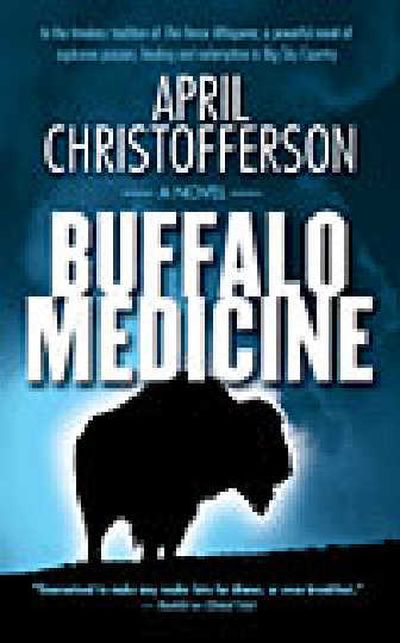Author’s experiences reflected in novels

April Christofferson isn’t shy about explaining what drives her to write.
Her stories, she says, reflect the things that she both cherishes and despises.
As she says on her Web site ( www.aprilchristofferson.com), what she cherishes includes “the fabulous wild places remaining on this earth, human kindness and courage, our capacity for love, all the earth’s creatures, and a rapidly advancing bio-technology that has the capability to improve, prolong and save lives.”
And the things she despises: “corporate greed; that same bio-technology, which, unchecked, has the capability of wreaking unequaled devastation; people who disregard the consequences of their actions to others, and to the earth.”
Such passion is at the center of Christofferson’s 2005 novel “Buffalo Medicine,” which is the July read of The Spokesman-Review Book Club.
“I’m very issue-oriented,” Christofferson said Wednesday during a phone interview from Missoula. “And once I got into the bio-tech industry, you could never exhaust all the issues if you tried.”
A native of Chicago who earned her law degree in 1983 at Gonzaga University, Christofferson has had six novels published since the mid-‘90s. Her seventh, “Alpha Female,” is due out sometime later this year or in early 2008.
While a native Midwesterner, Christofferson has always had ties with the West. Her grandfather owned a ranch in Laramie, Wyo., where he worked as a veterinarian, rodeo rider and stunt man (and in 1998 was inducted into the Cowboy Hall of Fame).
She came to the Inland Northwest after graduating from the University of Utah in 1973, having been accepted at the vet school at Washington State University. But when her plans conflicted with those of her husband’s, she made the sacrifice, dropped out and attended law school instead.
Christofferson and her family (their son works as a ranger in Yellowstone National Park, and their daughter is a student at the University of Montana) moved to Coeur d’Alene, then to Seattle in 1987, where they stayed for 14 years.
They moved back to Coeur d’Alene in 2001. And now they split time between there and Missoula.
It was while she was working as a lawyer in Seattle – first in entertainment law and then in the bio-tech community – that Christofferson wrote her first novel, “After the Dance.”
The success of that novel, which was published by a small press, garnered her an agent and a progressive series of book deals with national publishers (most recently Forge Press).
“When I signed originally, they wanted me to write medical thrillers,” Christofferson said. “But I had gone to work in the bio-tech industry, and the minute I started working there I thought, ‘Oh my God, this is the best setting for a thriller.’ “
But after three novels in that genre, she hatched a new idea.
“What happened was that I was under contract to write these medical thrillers,” she said, “and literally it just says that I just have to deliver two books, one a year. And then I went to Yellowstone.”
She’d been visiting Yellowstone her entire life and so, she said, “It became the world’s biggest thrill when my son became a ranger.”
It was her son, she said, “who opened my eyes to the bison controversy there. I had no clue what was going on. And when I did, I thought, ‘I have to write about this.’ “
“Buffalo Medicine” tells the story of a veterinarian who gets caught up in the struggle between ranchers – who see the bison as a threat to their cattle (due to a condition called brucellosis, which cattle breeders accuse bison of passing on to their herds) – and environmentalists, who are sworn to protect the endangered animals.
The vet, who has worked for the ranchers, shows that the bison aren’t the problem – which makes him a target.
“It will certainly be of interest to (young adults) familiar with the seemingly endless conflicts in the West that center around land use,” wrote reviewer Claire Rosser of the trade literary journal KLIATT.
“It’s a good story that puts the reader in the midst of a struggle larger than the individuals involved in the plot.”
“The feedback I get is that it’s a really exciting story,” Christofferson said. “But my primary goal was to educate people about the bison situation in Yellowstone.”
And when it came to doing that, she decided that fiction worked better than nonfiction.
“My thinking was, and I still believe this really strongly, is that people don’t necessarily want to read about these issues,” Christofferson said. “They’re not really upbeat topics.
“But if you can tell them in the context of a great story, and develop characters that people care about, I find that people become very passionate.”
Just like the writer who inspired them.